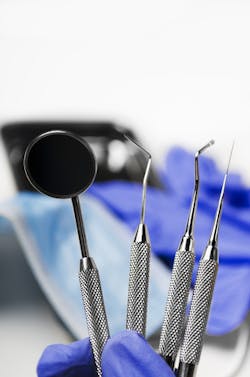Ask Emily: How to get along with instructors and what you should know about ordering instruments for your first operatory
Emily Boge, RDH, BS
April 18, 2013
“Nothing I do is good enough for my clinical instructor.”
Dear Emily,
I am struggling with one of my clinical instructors. No matter what I do, nothing seems to be good enough for her. I want to say something to her, but I do not want it to affect the way she treats me. I worry that if I do say something, it may pose further harm to my grade. What should I do?
-Steve Student
Dear Steve,
I cannot name one hygienist I know who did not share your feeling at some time during his or her dental hygiene education. As part of our dental hygienist make-up, we desire a high level of achievement when proving our skills. So, speaking for the collective whole of hygienists, I hear you!
As for addressing the issue, the first step I would take would be to approach your instructor after clinic and ask her if you can arrange for an office appointment to discuss some questions you have. Keep the request simple and courteous. Also, offering to meet at a time outside the clinic offers both parties privacy apart from the extra ears that hang about the clinic setting.
Come to the meeting prepared. Politely present the instructor with specific examples of episodes when you did not understand her criticism. Share with her the evidence behind your performance in clinic. Explain your concern – not from the grade perspective but from a learning perspective. The instructors in clinic are there to help you succeed. Maintaining clarity in what is expected from students opens communication and fosters a more positive environment for skill growth.
The absolute key to this crucial conversation is keeping a long fuse. Leave accusations, negativity, and fear at the door, since drama and anger solve no issue. Most importantly, speak only for yourself, and be honest. Instructors tend to shut down if you begin comparing your work to the work of your classmates, or inflate the actual situation to make him or her to be the “bad guy” in the situation.
I wish you the best of luck. And hang in there – the reward is sweet in the end.
“I’m a new hygienist – what instruments should I order?”
Dear Emily,
I just passed my boards and accepted my first position in a general practice. At my final interview, my employer asked me to make a list of the instruments I would like to have ordered. I have never worked in a private practice dental office. What is the standard cassette, how many should I order, and where do I go from here?
-Heather from Ohio
Dear Heather,
Congratulations! I am so excited you have chosen this great profession and I wish you many years of success.
The endless choices in instrumentation can be overwhelming, especially for someone in your position. First, I would consider how many patients you plan to see in a day and how your office chooses to sterilize instruments. This will guide you in the number of cassettes you choose to purchase. I see eight to nine patients a day and I have six general cassettes with 14 instrument slots available. I also have two implant cassettes that are smaller, with five instrument slots. I keep two cassettes with perio files and diamond instruments in five slot cases as well. In addition, I have three sets of ultrasonic tips, along with some individually bagged insets in my drawer. The easiest way to begin is to see what is already at the office and order what you need from there. I encourage you to purchase locking cassettes for their protective benefits for the individual who sterilizes them, yourself, and the general wear and tear on the tools. The other nice thing about locking cassettes is that you can order them color coded. I work at an office with 10 providers (seven hygienists and three doctors). My color is yellow. All items are coded in yellow bands and tapes so they make their way back to my room after being sterilized.
Considering what is in a cassette can be a bit more difficult. In dental hygiene school, the manufacturer and standard cassettes are purchased as part of your clinical fees. In the real world, you have a multitude of choices in standard instruments, extra strength instruments that require little or no sharpening, and various implant instruments. Resin handles, color coded handles, fat handles, skinny handles, gnarled handles – it can get a little scary. My advice is to speak with your representatives from various instrument companies and ask a lot of questions. Do not be afraid to take some time at the exhibit floor of your local dental hygiene convention, or at RDH Under One Roof, and physically pick up the instruments. Bring your loupes; sit down at a typodont, and play. If you find a new instrument you really like, purchase one to start. Take it back to the office, and see if it is a keeper before you commit to ordering one for each cassette. Many companies have a buy-more-save-more deal, but if you explain that you are a new grad and you need some time to adapt they may give you the same deal after you decide what to purchase. Do not be afraid to ask what deals are available, and remember to focus on what you like instead of what is the prettiest, cheapest, or fanciest in appearance. If the tool does not work in your hand like you want it to, it does not matter what it looks like sitting in a tray.
At my office, we use a SciScan Hydrim cleaner and wrap all cassettes to Midmark steam sterilize. It is important when purchasing instruments to know the care they will need to stay clean and safe to use. The manufacturers and company representatives are there for your education and information. Never hesitate to call them and ask questions; sometimes they learn just as much from you as you learn from them.
---
Resident hygiene expert Emily Boge answers your toughest questions on professional relationships with instructors, employers, and patients, what to use and know in the clinical setting, and how to successfully make the transition from student to professional. Send your questions to [email protected], and you may see it in next month’s column!



